Researching on Racism in Canada
VerifiedAdded on 2023/06/03
|7
|1518
|420
AI Summary
This essay delves upon the issue of racism in Canada by including sources from the internet as well as journals. It discusses and analyzes the three sources that are taken from the internet and five scholarly articles to see the difference between both the sources.
Contribute Materials
Your contribution can guide someone’s learning journey. Share your
documents today.
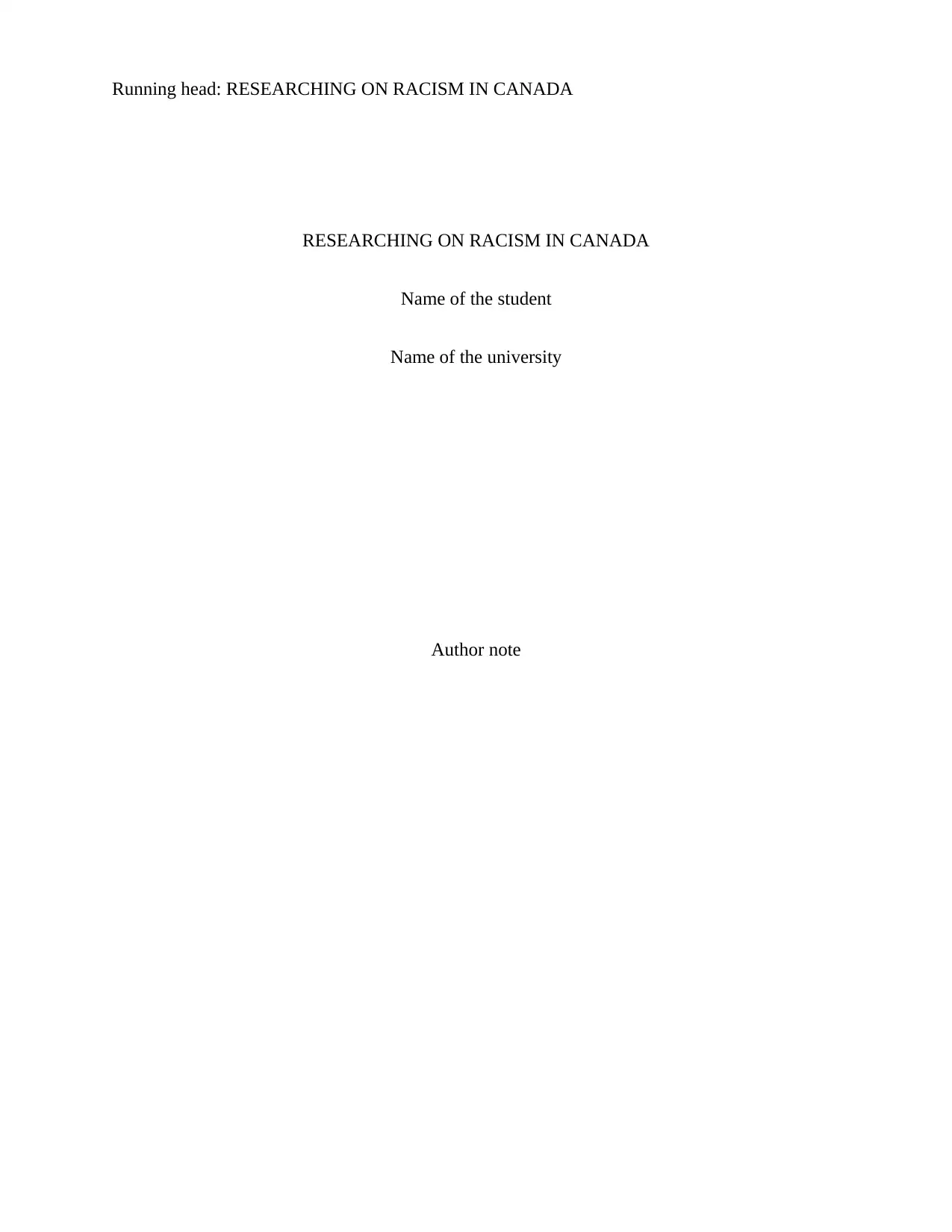
Running head: RESEARCHING ON RACISM IN CANADA
RESEARCHING ON RACISM IN CANADA
Name of the student
Name of the university
Author note
RESEARCHING ON RACISM IN CANADA
Name of the student
Name of the university
Author note
Secure Best Marks with AI Grader
Need help grading? Try our AI Grader for instant feedback on your assignments.
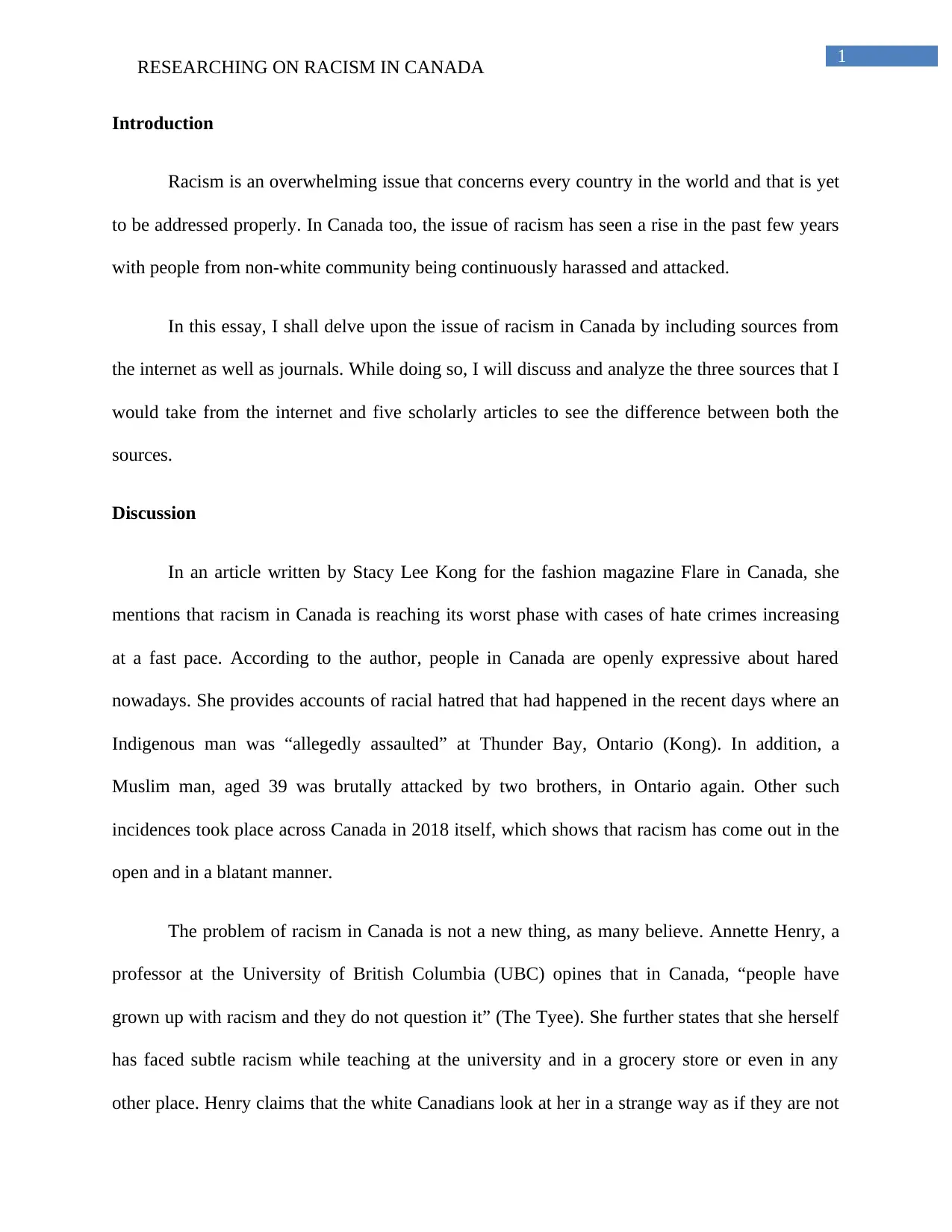
1
RESEARCHING ON RACISM IN CANADA
Introduction
Racism is an overwhelming issue that concerns every country in the world and that is yet
to be addressed properly. In Canada too, the issue of racism has seen a rise in the past few years
with people from non-white community being continuously harassed and attacked.
In this essay, I shall delve upon the issue of racism in Canada by including sources from
the internet as well as journals. While doing so, I will discuss and analyze the three sources that I
would take from the internet and five scholarly articles to see the difference between both the
sources.
Discussion
In an article written by Stacy Lee Kong for the fashion magazine Flare in Canada, she
mentions that racism in Canada is reaching its worst phase with cases of hate crimes increasing
at a fast pace. According to the author, people in Canada are openly expressive about hared
nowadays. She provides accounts of racial hatred that had happened in the recent days where an
Indigenous man was “allegedly assaulted” at Thunder Bay, Ontario (Kong). In addition, a
Muslim man, aged 39 was brutally attacked by two brothers, in Ontario again. Other such
incidences took place across Canada in 2018 itself, which shows that racism has come out in the
open and in a blatant manner.
The problem of racism in Canada is not a new thing, as many believe. Annette Henry, a
professor at the University of British Columbia (UBC) opines that in Canada, “people have
grown up with racism and they do not question it” (The Tyee). She further states that she herself
has faced subtle racism while teaching at the university and in a grocery store or even in any
other place. Henry claims that the white Canadians look at her in a strange way as if they are not
RESEARCHING ON RACISM IN CANADA
Introduction
Racism is an overwhelming issue that concerns every country in the world and that is yet
to be addressed properly. In Canada too, the issue of racism has seen a rise in the past few years
with people from non-white community being continuously harassed and attacked.
In this essay, I shall delve upon the issue of racism in Canada by including sources from
the internet as well as journals. While doing so, I will discuss and analyze the three sources that I
would take from the internet and five scholarly articles to see the difference between both the
sources.
Discussion
In an article written by Stacy Lee Kong for the fashion magazine Flare in Canada, she
mentions that racism in Canada is reaching its worst phase with cases of hate crimes increasing
at a fast pace. According to the author, people in Canada are openly expressive about hared
nowadays. She provides accounts of racial hatred that had happened in the recent days where an
Indigenous man was “allegedly assaulted” at Thunder Bay, Ontario (Kong). In addition, a
Muslim man, aged 39 was brutally attacked by two brothers, in Ontario again. Other such
incidences took place across Canada in 2018 itself, which shows that racism has come out in the
open and in a blatant manner.
The problem of racism in Canada is not a new thing, as many believe. Annette Henry, a
professor at the University of British Columbia (UBC) opines that in Canada, “people have
grown up with racism and they do not question it” (The Tyee). She further states that she herself
has faced subtle racism while teaching at the university and in a grocery store or even in any
other place. Henry claims that the white Canadians look at her in a strange way as if they are not
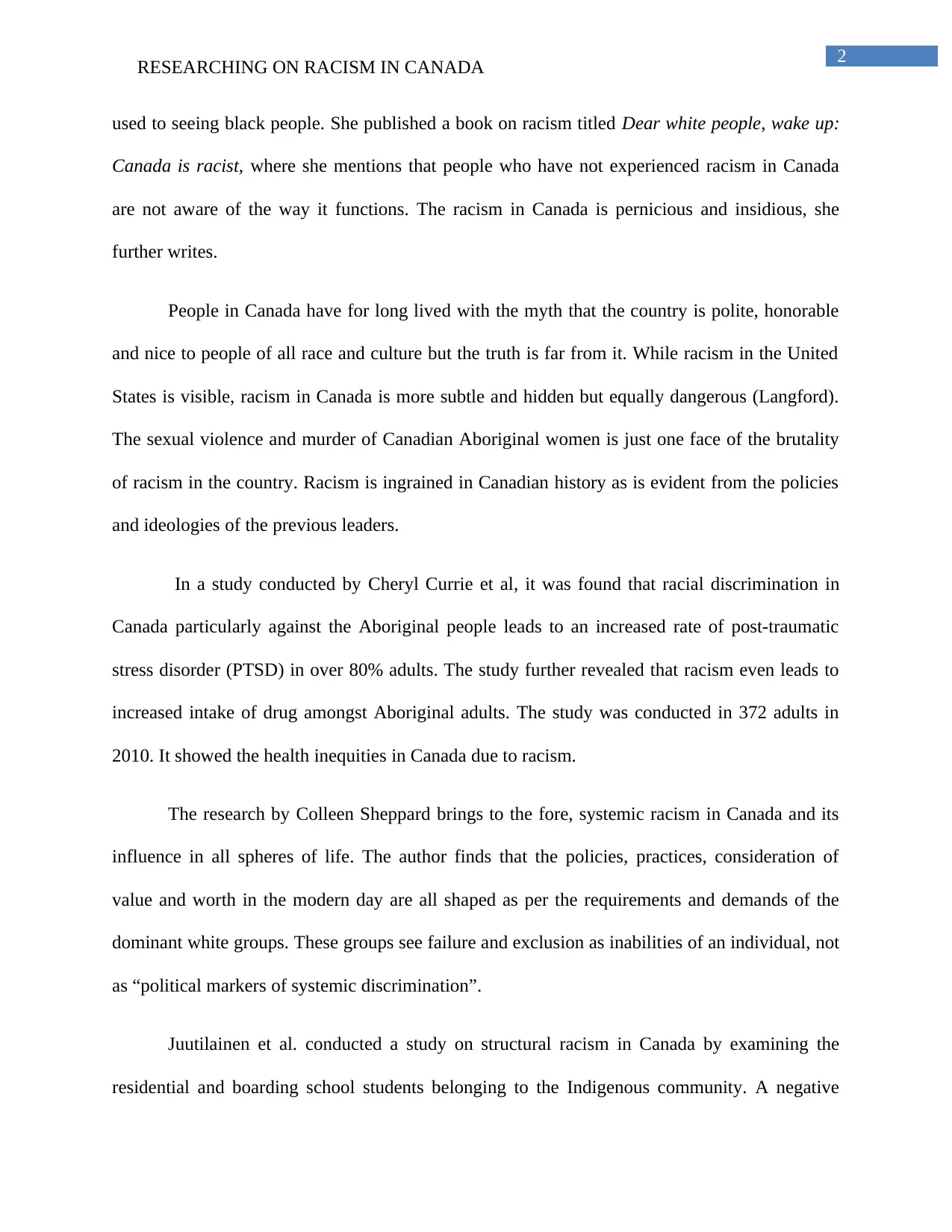
2
RESEARCHING ON RACISM IN CANADA
used to seeing black people. She published a book on racism titled Dear white people, wake up:
Canada is racist, where she mentions that people who have not experienced racism in Canada
are not aware of the way it functions. The racism in Canada is pernicious and insidious, she
further writes.
People in Canada have for long lived with the myth that the country is polite, honorable
and nice to people of all race and culture but the truth is far from it. While racism in the United
States is visible, racism in Canada is more subtle and hidden but equally dangerous (Langford).
The sexual violence and murder of Canadian Aboriginal women is just one face of the brutality
of racism in the country. Racism is ingrained in Canadian history as is evident from the policies
and ideologies of the previous leaders.
In a study conducted by Cheryl Currie et al, it was found that racial discrimination in
Canada particularly against the Aboriginal people leads to an increased rate of post-traumatic
stress disorder (PTSD) in over 80% adults. The study further revealed that racism even leads to
increased intake of drug amongst Aboriginal adults. The study was conducted in 372 adults in
2010. It showed the health inequities in Canada due to racism.
The research by Colleen Sheppard brings to the fore, systemic racism in Canada and its
influence in all spheres of life. The author finds that the policies, practices, consideration of
value and worth in the modern day are all shaped as per the requirements and demands of the
dominant white groups. These groups see failure and exclusion as inabilities of an individual, not
as “political markers of systemic discrimination”.
Juutilainen et al. conducted a study on structural racism in Canada by examining the
residential and boarding school students belonging to the Indigenous community. A negative
RESEARCHING ON RACISM IN CANADA
used to seeing black people. She published a book on racism titled Dear white people, wake up:
Canada is racist, where she mentions that people who have not experienced racism in Canada
are not aware of the way it functions. The racism in Canada is pernicious and insidious, she
further writes.
People in Canada have for long lived with the myth that the country is polite, honorable
and nice to people of all race and culture but the truth is far from it. While racism in the United
States is visible, racism in Canada is more subtle and hidden but equally dangerous (Langford).
The sexual violence and murder of Canadian Aboriginal women is just one face of the brutality
of racism in the country. Racism is ingrained in Canadian history as is evident from the policies
and ideologies of the previous leaders.
In a study conducted by Cheryl Currie et al, it was found that racial discrimination in
Canada particularly against the Aboriginal people leads to an increased rate of post-traumatic
stress disorder (PTSD) in over 80% adults. The study further revealed that racism even leads to
increased intake of drug amongst Aboriginal adults. The study was conducted in 372 adults in
2010. It showed the health inequities in Canada due to racism.
The research by Colleen Sheppard brings to the fore, systemic racism in Canada and its
influence in all spheres of life. The author finds that the policies, practices, consideration of
value and worth in the modern day are all shaped as per the requirements and demands of the
dominant white groups. These groups see failure and exclusion as inabilities of an individual, not
as “political markers of systemic discrimination”.
Juutilainen et al. conducted a study on structural racism in Canada by examining the
residential and boarding school students belonging to the Indigenous community. A negative
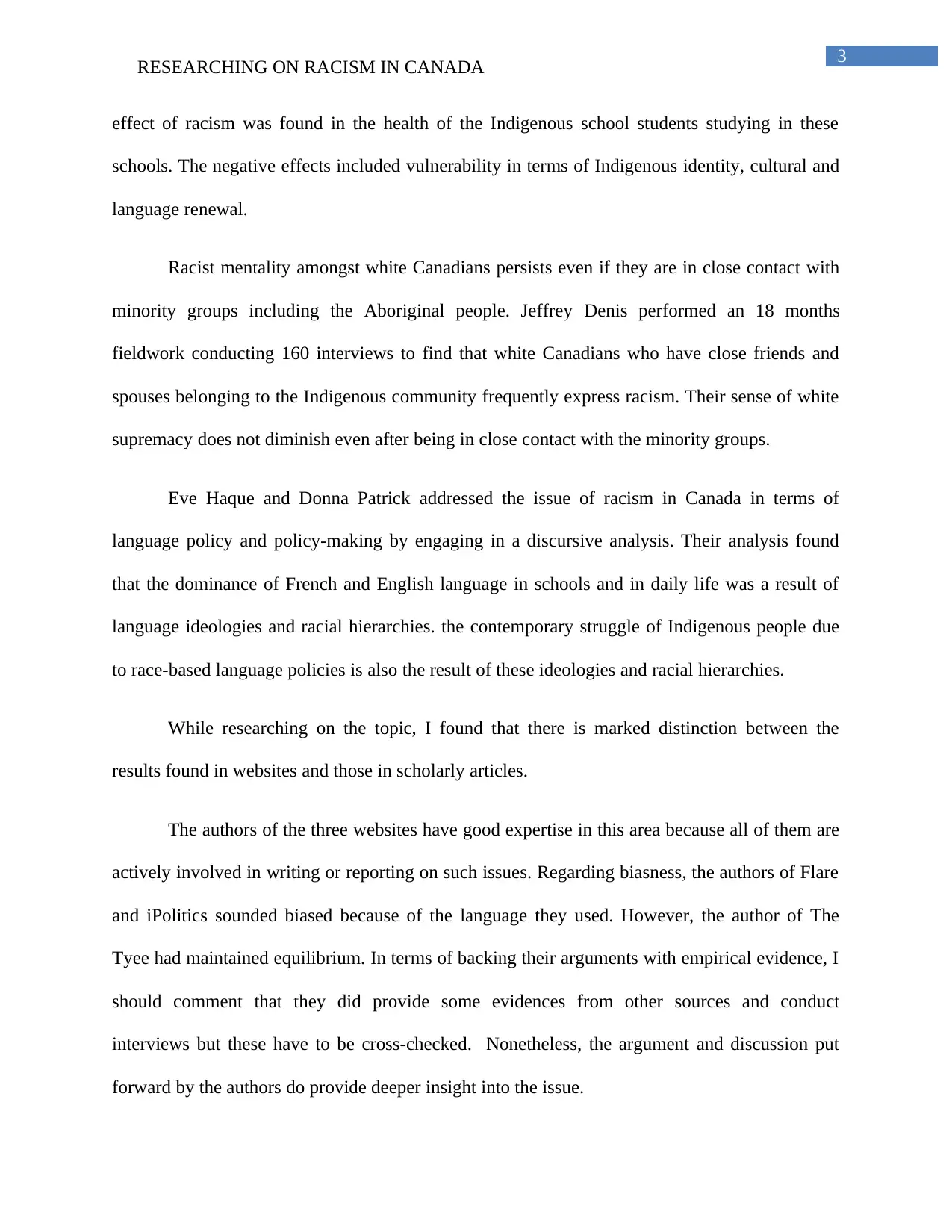
3
RESEARCHING ON RACISM IN CANADA
effect of racism was found in the health of the Indigenous school students studying in these
schools. The negative effects included vulnerability in terms of Indigenous identity, cultural and
language renewal.
Racist mentality amongst white Canadians persists even if they are in close contact with
minority groups including the Aboriginal people. Jeffrey Denis performed an 18 months
fieldwork conducting 160 interviews to find that white Canadians who have close friends and
spouses belonging to the Indigenous community frequently express racism. Their sense of white
supremacy does not diminish even after being in close contact with the minority groups.
Eve Haque and Donna Patrick addressed the issue of racism in Canada in terms of
language policy and policy-making by engaging in a discursive analysis. Their analysis found
that the dominance of French and English language in schools and in daily life was a result of
language ideologies and racial hierarchies. the contemporary struggle of Indigenous people due
to race-based language policies is also the result of these ideologies and racial hierarchies.
While researching on the topic, I found that there is marked distinction between the
results found in websites and those in scholarly articles.
The authors of the three websites have good expertise in this area because all of them are
actively involved in writing or reporting on such issues. Regarding biasness, the authors of Flare
and iPolitics sounded biased because of the language they used. However, the author of The
Tyee had maintained equilibrium. In terms of backing their arguments with empirical evidence, I
should comment that they did provide some evidences from other sources and conduct
interviews but these have to be cross-checked. Nonetheless, the argument and discussion put
forward by the authors do provide deeper insight into the issue.
RESEARCHING ON RACISM IN CANADA
effect of racism was found in the health of the Indigenous school students studying in these
schools. The negative effects included vulnerability in terms of Indigenous identity, cultural and
language renewal.
Racist mentality amongst white Canadians persists even if they are in close contact with
minority groups including the Aboriginal people. Jeffrey Denis performed an 18 months
fieldwork conducting 160 interviews to find that white Canadians who have close friends and
spouses belonging to the Indigenous community frequently express racism. Their sense of white
supremacy does not diminish even after being in close contact with the minority groups.
Eve Haque and Donna Patrick addressed the issue of racism in Canada in terms of
language policy and policy-making by engaging in a discursive analysis. Their analysis found
that the dominance of French and English language in schools and in daily life was a result of
language ideologies and racial hierarchies. the contemporary struggle of Indigenous people due
to race-based language policies is also the result of these ideologies and racial hierarchies.
While researching on the topic, I found that there is marked distinction between the
results found in websites and those in scholarly articles.
The authors of the three websites have good expertise in this area because all of them are
actively involved in writing or reporting on such issues. Regarding biasness, the authors of Flare
and iPolitics sounded biased because of the language they used. However, the author of The
Tyee had maintained equilibrium. In terms of backing their arguments with empirical evidence, I
should comment that they did provide some evidences from other sources and conduct
interviews but these have to be cross-checked. Nonetheless, the argument and discussion put
forward by the authors do provide deeper insight into the issue.
Secure Best Marks with AI Grader
Need help grading? Try our AI Grader for instant feedback on your assignments.
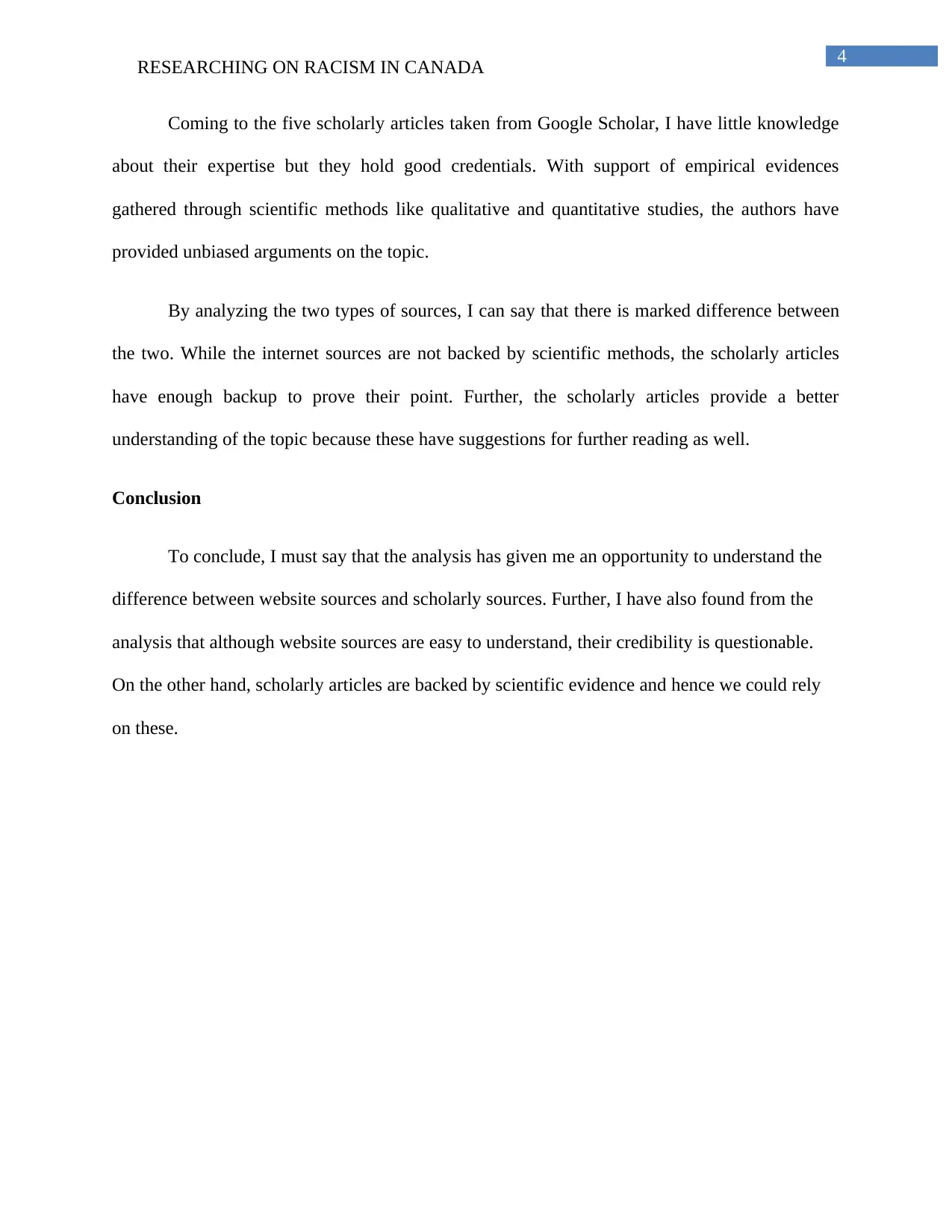
4
RESEARCHING ON RACISM IN CANADA
Coming to the five scholarly articles taken from Google Scholar, I have little knowledge
about their expertise but they hold good credentials. With support of empirical evidences
gathered through scientific methods like qualitative and quantitative studies, the authors have
provided unbiased arguments on the topic.
By analyzing the two types of sources, I can say that there is marked difference between
the two. While the internet sources are not backed by scientific methods, the scholarly articles
have enough backup to prove their point. Further, the scholarly articles provide a better
understanding of the topic because these have suggestions for further reading as well.
Conclusion
To conclude, I must say that the analysis has given me an opportunity to understand the
difference between website sources and scholarly sources. Further, I have also found from the
analysis that although website sources are easy to understand, their credibility is questionable.
On the other hand, scholarly articles are backed by scientific evidence and hence we could rely
on these.
RESEARCHING ON RACISM IN CANADA
Coming to the five scholarly articles taken from Google Scholar, I have little knowledge
about their expertise but they hold good credentials. With support of empirical evidences
gathered through scientific methods like qualitative and quantitative studies, the authors have
provided unbiased arguments on the topic.
By analyzing the two types of sources, I can say that there is marked difference between
the two. While the internet sources are not backed by scientific methods, the scholarly articles
have enough backup to prove their point. Further, the scholarly articles provide a better
understanding of the topic because these have suggestions for further reading as well.
Conclusion
To conclude, I must say that the analysis has given me an opportunity to understand the
difference between website sources and scholarly sources. Further, I have also found from the
analysis that although website sources are easy to understand, their credibility is questionable.
On the other hand, scholarly articles are backed by scientific evidence and hence we could rely
on these.
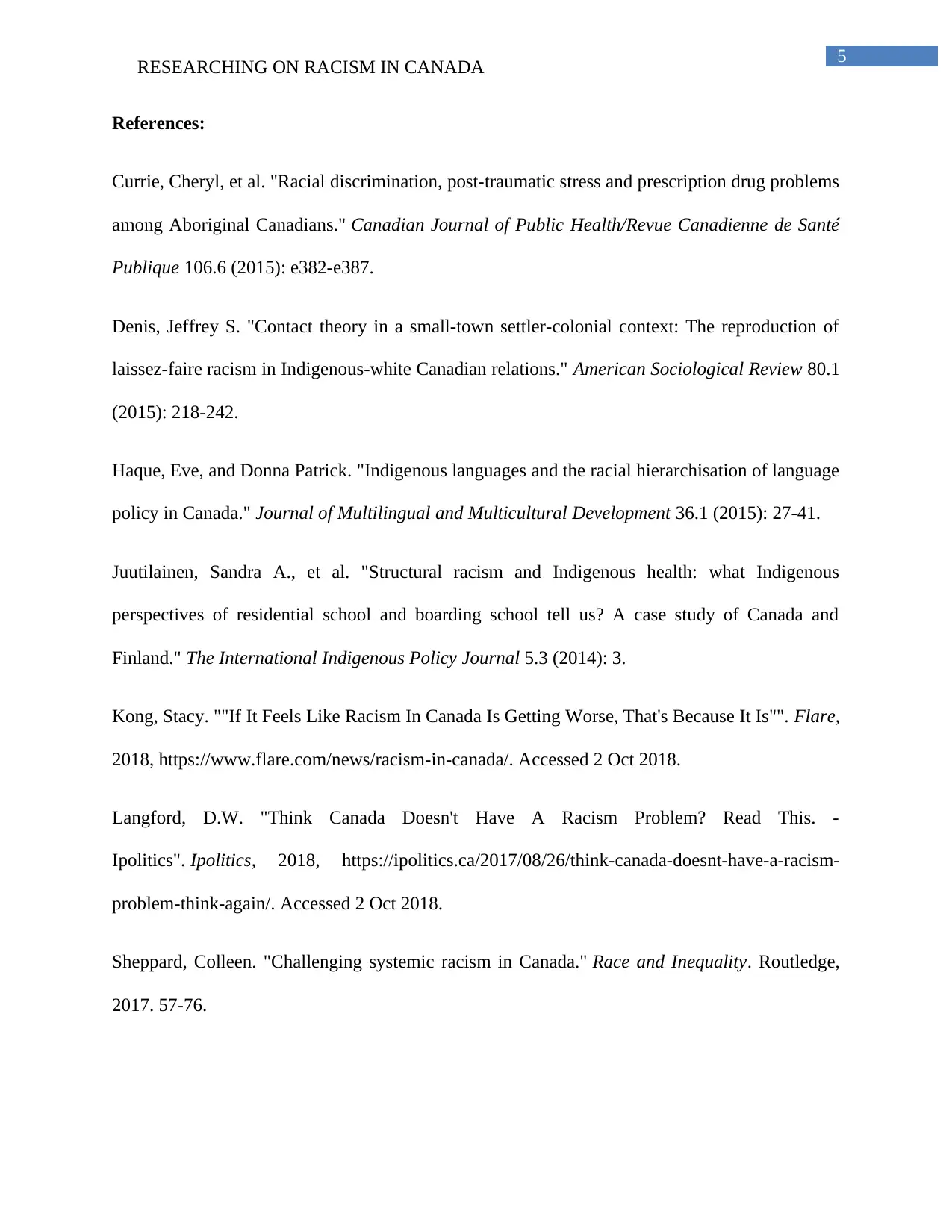
5
RESEARCHING ON RACISM IN CANADA
References:
Currie, Cheryl, et al. "Racial discrimination, post-traumatic stress and prescription drug problems
among Aboriginal Canadians." Canadian Journal of Public Health/Revue Canadienne de Santé
Publique 106.6 (2015): e382-e387.
Denis, Jeffrey S. "Contact theory in a small-town settler-colonial context: The reproduction of
laissez-faire racism in Indigenous-white Canadian relations." American Sociological Review 80.1
(2015): 218-242.
Haque, Eve, and Donna Patrick. "Indigenous languages and the racial hierarchisation of language
policy in Canada." Journal of Multilingual and Multicultural Development 36.1 (2015): 27-41.
Juutilainen, Sandra A., et al. "Structural racism and Indigenous health: what Indigenous
perspectives of residential school and boarding school tell us? A case study of Canada and
Finland." The International Indigenous Policy Journal 5.3 (2014): 3.
Kong, Stacy. ""If It Feels Like Racism In Canada Is Getting Worse, That's Because It Is"". Flare,
2018, https://www.flare.com/news/racism-in-canada/. Accessed 2 Oct 2018.
Langford, D.W. "Think Canada Doesn't Have A Racism Problem? Read This. -
Ipolitics". Ipolitics, 2018, https://ipolitics.ca/2017/08/26/think-canada-doesnt-have-a-racism-
problem-think-again/. Accessed 2 Oct 2018.
Sheppard, Colleen. "Challenging systemic racism in Canada." Race and Inequality. Routledge,
2017. 57-76.
RESEARCHING ON RACISM IN CANADA
References:
Currie, Cheryl, et al. "Racial discrimination, post-traumatic stress and prescription drug problems
among Aboriginal Canadians." Canadian Journal of Public Health/Revue Canadienne de Santé
Publique 106.6 (2015): e382-e387.
Denis, Jeffrey S. "Contact theory in a small-town settler-colonial context: The reproduction of
laissez-faire racism in Indigenous-white Canadian relations." American Sociological Review 80.1
(2015): 218-242.
Haque, Eve, and Donna Patrick. "Indigenous languages and the racial hierarchisation of language
policy in Canada." Journal of Multilingual and Multicultural Development 36.1 (2015): 27-41.
Juutilainen, Sandra A., et al. "Structural racism and Indigenous health: what Indigenous
perspectives of residential school and boarding school tell us? A case study of Canada and
Finland." The International Indigenous Policy Journal 5.3 (2014): 3.
Kong, Stacy. ""If It Feels Like Racism In Canada Is Getting Worse, That's Because It Is"". Flare,
2018, https://www.flare.com/news/racism-in-canada/. Accessed 2 Oct 2018.
Langford, D.W. "Think Canada Doesn't Have A Racism Problem? Read This. -
Ipolitics". Ipolitics, 2018, https://ipolitics.ca/2017/08/26/think-canada-doesnt-have-a-racism-
problem-think-again/. Accessed 2 Oct 2018.
Sheppard, Colleen. "Challenging systemic racism in Canada." Race and Inequality. Routledge,
2017. 57-76.

6
RESEARCHING ON RACISM IN CANADA
The Tyee. "‘We, As Canadians, Are Afraid To Deal With Racism’ | The Tyee". The Tyee, 2018,
https://thetyee.ca/News/2017/09/29/Canadians-Are-Afraid-to-Deal-with-Racism/. Accessed 2
Oct 2018.
RESEARCHING ON RACISM IN CANADA
The Tyee. "‘We, As Canadians, Are Afraid To Deal With Racism’ | The Tyee". The Tyee, 2018,
https://thetyee.ca/News/2017/09/29/Canadians-Are-Afraid-to-Deal-with-Racism/. Accessed 2
Oct 2018.
1 out of 7
Your All-in-One AI-Powered Toolkit for Academic Success.
+13062052269
info@desklib.com
Available 24*7 on WhatsApp / Email
![[object Object]](/_next/static/media/star-bottom.7253800d.svg)
Unlock your academic potential
© 2024 | Zucol Services PVT LTD | All rights reserved.


